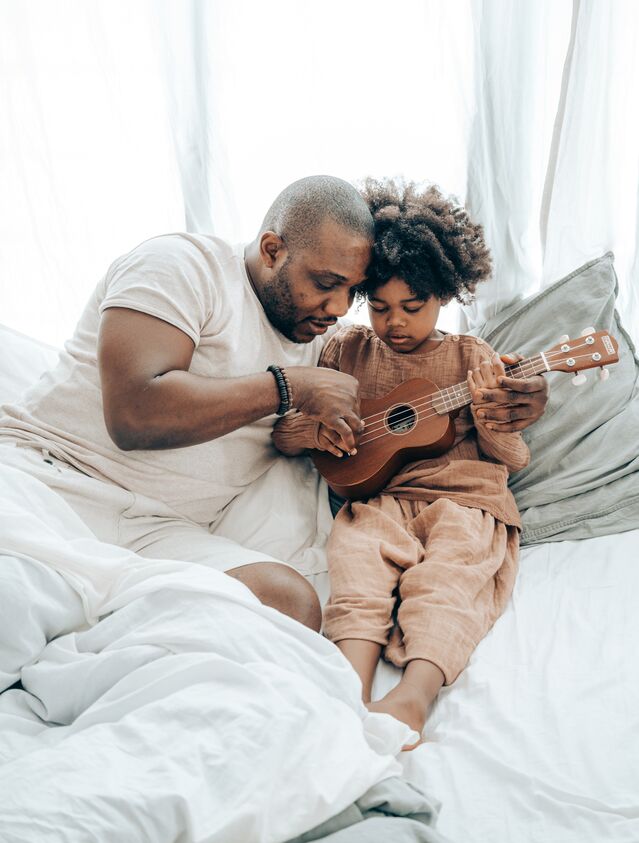Motivation
Parent-Child Music Lessons
Based on family systems psychotherapy, conjoint music lessons are a success.
Posted August 22, 2020

Over the past 20 years, I have noticed that parents who play an instrument themselves often approach their child’s music lessons with a different attitude than those who have not studied music. The parent’s expectations about intention, progress, and goals are typically more realistic and empathic than those who have not experienced the process of studying an instrument themself.
It is not uncommon to find that music students who dedicate themselves and commit to a lifelong relationship with music lessons are children of parents who have studied and play an instrument themselves. Although this is not true of everyone, the majority of my colleagues studying at the conservatory had parents who were musicians.
When someone contacts me inquiring about music lessons for their child they are often surprised to learn that I will only teach young students conjointly with a parent. Although this is not what every parent is interested in, for the ones who are, the music learning and making experience has been one that creates a shared bond between child and parent, results in realistic expectations from the parent, serves as model for the habits of success in learning an instrument, and has shown to be a model that fosters long-term commitment to the study of music. I call this method, family systems or conjoint music lessons.
The idea came from my study of family systems psychotherapy. In family systems therapy the child is not seen as the focus of therapy, but rather the entire family atmosphere is taken as a whole, and the family system is examined and educated towards the goal of a better functioning family structure. Applying these ideas to family systems music lessons has resulted in successful conditions for learning.
What is success when discussing music lessons? To me, success is being good enough. Being a good enough musician is something I take from the psychoanalyst Donald Winnicott who coined the term the good enough mother. Someone who is good enough is not concerned with perfection, but rather is concerned with doing their best and feeling satisfied with the process of learning music for pleasure. This attitude of the good enough parent got me to thinking about how I deliver music lessons to young people, as well as the role of the parent in music lessons. In addition to Donald Winnicott, the works of Alfred Adler, Alice Miller, and Bruno Bettelheim have been particularly useful in developing the parent-child conjoint music lesson approach.
It has been my experience that what differentiates the experience of the student whose parent has studied an instrument from the student whose parent has not studied an instrument is one of habit. The parent who has experience with managing the personal expectations, the necessary habits, and the patience with oneself throughout the learning process approaches their child’s lessons with an attitude that is often more conducive to success than those who have not studied an instrument.
The music lessons are typical with the exception that the parent commits to attending, practicing, and being a part of their child’s music learning experience. Parent and child sit together at the piano or with their respective instruments, and take the lesson conjointly, learning together, practicing, and playing together. For the beginning parent, this arrangement approximates the experience that a child has with a parent who has studied an instrument and stuck with it.
Parents who have studied an instrument know that there is no magical ability, no special talent to learning an instrument. The only secret skill is one that anyone can cultivate: the habit of dedicated practice. The insight that those who stick with it have is simply the decision to stick with it. When a parent takes the lesson with the child, they are making a commitment with the child to learn the instrument. The mutual accountability is a recipe for success.
The parent who takes the lesson with the child teaches through demonstration to attend the weekly lesson, devote time each day to practice, and to commit oneself to the accomplishing of personal goals; both short- and long-term. The adage “actions speak louder than words” seems to describe the message that is sent to the child when they see the parent sit down for their daily practice.
The parent also demonstrates for the child the importance of setting and working towards realistic goals with patience and persistence. The parent who is taking the music lesson is learning not only the material that the child is learning but also more advanced concepts that the child will notice and be inspired towards accomplishing in the future.
Through conjoint, family systems music lessons, the parent and child foster a creative bond in playing and learning together at the instrument.




